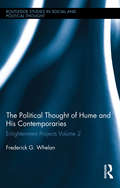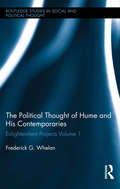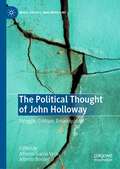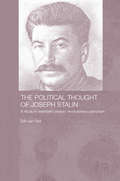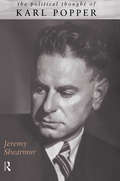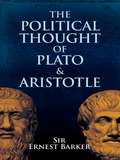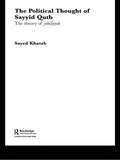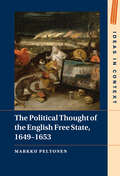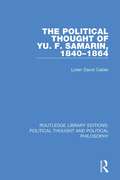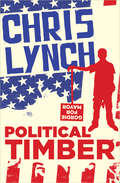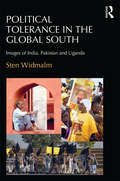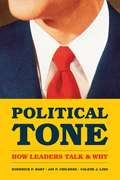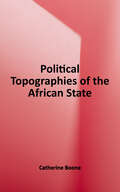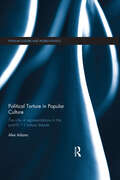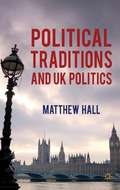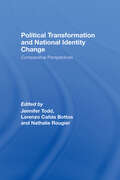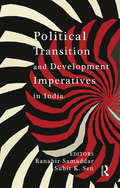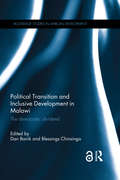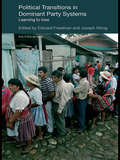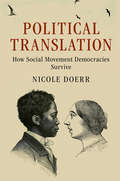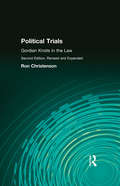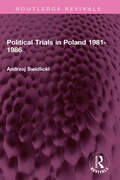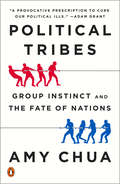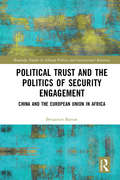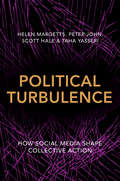- Table View
- List View
Political Thought of Hume and his Contemporaries: Enlightenment Projects Vol. 2 (Routledge Studies in Social and Political Thought)
by Frederick G. WhelanIntended for scholars in the fields of political theory, and the history of political thought, this two-volume examines David Hume's Political Thought (1711-1776) and that of his contemporaries, including Smith, Blackstone, Burke and Robertson. This book is unified by its temporal focus on the middle and later decades of the eighteenth century and hence on what is usually taken to be the core period of the Enlightenment, a somewhat problematic term. Covering topics such as property, contract and resistance theory, religious establishments, the law of nations, the balance of power, demography, and the role of unintended consequences in social life, Frederick G. Whelan convincingly conveys the diversity--and creativity--of the intellectual engagements of even a limited set of Enlightenment thinkers in contrast to dismissive attitudes, in some quarters, toward the Enlightenment and its supposed unitary project. Political Thought of Hume and his Contemporaries: Enlightenment Projects Vol. 2 contains six in-depth studies of eighteenth-century political thought, including both normative issues and examples of Enlightenment social science, including international relations and law, the problem of double standards, political economy, demography, and the causes of imperial decline. The central figure is David Hume, with substantial attention to William Robertson, Adam Smith, Montesquieu, Malthus, and others.
Political Thought of Hume and his Contemporaries: Enlightenment Projects Vol. 1 (Routledge Studies in Social and Political Thought)
by Frederick G. WhelanIntended for scholars in the fields of political theory, and the history of political thought, this two-volume examines David Hume's Political Thought (1711-1776) and that of his contemporaries, including Smith, Blackstone, Burke and Robertson. This book is unified by its temporal focus on the middle and later decades of the eighteenth century and hence on what is usually taken to be the core period of the Enlightenment, a somewhat problematic term. Covering topics such as property, contract and resistance theory, religious establishments, the law of nations, the balance of power, demography, and the role of unintended consequences in social life, Frederick G. Whelan convincingly conveys the diversity--and creativity--of the intellectual engagements of even a limited set of Enlightenment thinkers in contrast to dismissive attitudes, in some quarters, toward the Enlightenment and its supposed unitary project. Political Thought of Hume and his Contemporaries: Enlightenment Projects Vol. 1 contains six in-depth studies of issues in eighteenth-century political thought, with an emphasis on topics in normative theory such as property rights, the social contract, resistance to oppressive government, and religious liberty. The central figure is David Hume, with substantial attention to Edmund Burke, Adam Smith, and others in the period. The introduction situates the studies in the Enlightenment and considers interpretations of that movement.
The Political Thought of John Holloway: Struggle, Critique, Emancipation (Marx, Engels, and Marxisms)
by Alfonso García Vela Alberto BonnetThis book provides renewed reflection and critical discussion on John Holloway's political and theoretical thought. Two decades ago, in Change the World without Taking Power, Holloway set out on a path that he followed a decade later in Crack Capitalism and continues to walk today with his new book, Hope in Hopeless Times. The contributions in this volume critically analyze his innovative attempt to rethink the meaning and dynamics of revolution in the conditions of contemporary capitalism. More than ten years after the publication of Crack Capitalism, this volume aims to question Holloway's attempt, as well as his theoretical foundations in his original rereading of Marxism and Critical Theory and their relations with the characteristics adopted by the anti-capitalist struggles during the last two decades. Its authors, from different geographies, traditions, and scientific disciplines, establish throughout its pages a fruitful dialogue convened by Holloway's innovative ideas.
The Political Thought of Joseph Stalin: A Study in Twentieth Century Revolutionary Patriotism
by Erik van ReeThis book presents a comprehensive analysis of the political thought of Joseph Stalin. Making full use of the documentation that has recently become available, including Stalin's private library with his handwritten margin notes, the book provides many insights on Stalin, and also on western and Russian Marxist intellectual traditions. Overall, the book argues that Stalin's political thought is not primarily indebted to the Russian autocratic tradition, but belongs to a tradition of revolutionary patriotism that stretches back through revolutionary Marxism to Jacobin thought in the French Revolution. It makes interesting comparisons between Stalin, Lenin, Bukharin and Trotsky, and explains a great deal about the mindset of those brought up in the Stalinist era, and about the era's many key problems, including the industrial revolution from above, socialist cultural policy, Soviet treatment of nationalities, pre-war and Cold War foreign policy, and the purges.
The Political Thought of Karl Popper
by Jeremy ShearmurThe Political Thought of Karl Popper offers a controversial treatment of Popper's ideas about politics, informed by Shearmur's personal knowledge of Popper together with research on unpublished material in the Popper archive at the Hoover Institute.While sympathetic to Popper's overall approach, Shearmur offers criticism of some of his ideas and suggests that political conclusions should be drawn from Popper's ideas which differ from Popper's own views. Shearmur introduces Popper's political ideas by way of a discussion of their development, which draws upon archive material. He then offers a critical survey of some of the themes from his Open Society and Poverty of Historicism, and discusses the political significance of some of his later philosophical ideas. Wider themes within Popper's philosophy are drawn on to offer striking critical re-interpretations of his ethical ideas and social theory. The book concludes with a discussion which suggests that Popper's views should have been closer to classical liberalism than they in fact were.
The Political Thought of Plato and Aristotle
by E. BarkerThis clear and accurate exposition of Greek political thought offers a comprehensive exploration of the works of Plato and Aristotle. Students of political science and the history of Western philosophy will appreciate its insights into the sources of state power, the nature of political organization, the aims of the state, citizenship, justice, law, and related concepts. In addition to point-by-point discussions of Plato's Republic and Aristotle's Politics, this survey presents critical examinations of several of Plato's other dialogues along with Aristotle's Ethics. Further, it considers the origin of these ideas in the Greek political experience and in the contributions of other Greek theorists, including Heraclitus, Pythagoras, the Cyrenaics, and the Encyclopaedists. This classic of scholarship also includes epilogues that discuss the influence of Greek political ideas on such thinkers as Aquinas, Marsilio of Padua, Machiavelli, Spinoza, Hobbes, Rousseau, and Hegel.
The Political Thought of Sayyid Qutb: The Theory of Jahiliyyah (Routledge Studies in Political Islam)
by Sayed KhatabThis new book takes a literary approach in its study of Sayyid Qutb, one of the most significant political thinkers for contemporary Islamists and who has greatly influenced the likes of Osama Bin Laden. Executed by the Egyptian state in 1966, his books continue to be read and his theory of jahiliyya ‘ignorance’ is still of prime importance for radical Islamic groups. Through an examination of his thoughts and theories, the book explores the main concepts that are used by today’s radical fundamentalist movements, tracing the intellectual origins, as well as the conceptual and methodological thinking of radical Islamist movements in the modern world. The book sheds light on Islamic radicalism and its origins by presenting new analysis on the intellectual legacy of one of the most important thinkers of the modern Islamic revival. This is an invaluable new book for our time.
The Political Thought of the English Free State, 1649–1653 (Ideas in Context)
by Markku PeltonenEnglish republicanism has long been a major theme in the history of political thought, but the years of the English free state are often overlooked. Drawing on a wide range of sources, including the vast political pamphlet literature of the era, The Political Thought of the English Free State, 1649–1653 offers a provocative reassessment of the English Revolution and an original new perspective on English republicanism. Markku Peltonen explores the arguments in defence of the English free state and demonstrates the profound importance of the republican period. The pamphleteers who defended the free state maintained that the people, or their representatives, could alter the form of government whenever they deemed it advantageous, put forward powerful anti-monarchical arguments and widely shared the republican conviction that individual freedom could only materialise in a free state. Peltonen also highlights the unprecedented debate over whether the free state was an aristocracy or democracy and shows how, for the first time in English history, democracy was not only robustly defended but understood as representative.
The Political Thought of Yu. F. Samarin, 1840-1864 (Routledge Library Editions: Political Thought and Political Philosophy #9)
by Loren David CalderFirst published in 1987. Yu. F. Samarin (1819-1876) was one of the original SIavophiIs. He was the most important Slavophil statesman, making a very significant contribution to the formulation, drafting and implementation of the Emancipation Edict of 1861. He also served creatively in the whole range of Zemstvo council work at both the provincial and municipal levels, and made a substantial impact on policy as a passionate exponent of Russian interests in Poland and the Baltic provinces. In this study Samarin's development and performance as a political thinker is examined from his early days as a master’s student at the University of Moscow to the completion of his work on the peasant land reform in 1864. This book establishes that Samarin was a competent political theorist, who is best characterized as an "enlightened conservative". This title will be of great interest to students of history, politics and philosophy.
Political Timber
by Chris LynchGordie Foley can&’t wait to coast through his senior year—so how did he end up running for mayor?The best girl, the best car, and the best class schedule—Gordie Foley has it all in his final year of high school. When his beloved grandfather, the former mayor of the town, gives Gordie his trademark Studebaker Gran Tourismo Hawk for his eighteenth birthday, Gordie can&’t wait to live the most awesome senior year ever. But his grandfather has other plans. Calling the shots from prison, where he has been sent for racketeering, he sets up Gordie to run for town mayor to keep the family name in the news. Now Gordie is heading down the campaign trail—and this is a ride he can&’t just coast through. This ebook features an illustrated biography of Chris Lynch including rare images from the author&’s personal collection.
Political Tolerance in the Global South: Images of India, Pakistan and Uganda.
by Sten WidmalmWhat makes people agree to the extension of political rights to those they clearly dislike? This book moves beyond the extensive research on this question in western contexts to focus on the global south, offering unique empirical studies of political tolerance in plural societies where poverty is prevalent and democratic institutions can often be fragile. Based on extensive data gathered in India, Pakistan and Uganda, this volume offers an account of the factors that shape the foundations of a society and its capacity to be democratic, but where the need for the protection of human rights is great and where the state is either weak or even constitutes a counter-force against the rights of individuals and groups. Combining large scale survey data with in-depth interviews in each national setting, the author exemplifies the great variation of factors which are related to political tolerance, shedding light on the fundamental patterns existing in the organisation of state-society relations and the ways in which they produce certain results owing to the manner in which the forces of modernisation operate. A broad and empirically informed study of what shapes the foundations of a democratic society in modernising nations, Political Tolerance in the Global South will appeal to scholars of sociology and political science with interests in democracy, human rights, diversity and tolerance.
Political Tone: How Leaders Talk and Why
by Roderick P. Hart Jay P. Childers Colene J. LindIt's not what you say, but how you say it. Solving problems with words is the essence of politics, and finding the right words for the moment can make or break a politician's career. Yet very little has been said in political science about the elusive element of tone. In Political Tone, Roderick P. Hart, Jay P. Childers, and Colene J. Lind analyze a range of texts--from speeches and debates to advertising and print and broadcast campaign coverage-- using a sophisticated computer program, DICTION, that parses their content for semantic features like realism, commonality, and certainty, as well as references to religion, party, or patriotic terms. Beginning with a look at how societal forces like diversity and modernity manifest themselves as political tones in the contexts of particular leaders and events, the authors proceed to consider how individual leaders have used tone to convey their messages: How did Bill Clinton's clever dexterity help him recover from the Monica Lewinsky scandal? How did Barack Obama draw on his experience as a talented community activist to overcome his inexperience as a national leader? And how does Sarah Palin's wandering tone indicate that she trusts her listeners and is open to their ideas? By focusing not on the substance of political arguments but on how they were phrased, Political Tone provides powerful and unexpected insights into American politics.
Political Topographies of the African State: Territorial Authority and Institutional Choice
by Catherine BooneThis 2003 study brings Africa into the mainstream of studies of state-formation in agrarian societies. Territorial integration is the challenge: institutional linkages and political deals that bind center and periphery are the solutions. In African countries, as in territorially diverse states around the world, rulers at the center are forced to bargain with regional elites to establish stable mechanisms of rule and taxation. Variation in regional forms of social organization make for differences in the interests and political strength of regional leaders who seek to maintain or enhance their power vis-à-vis their followers and subjects, and also vis-à-vis the center. The uneven political topography of the regions ultimately produces unevenness in the patterns and depth of center-region linkage. Six sub-regions of three West African countries - Senegal, Cote d'Ivoire, and Ghana - are the backbone of the study.
Political Torture in Popular Culture: The Role of Representations in the Post-9/11 Torture Debate (Popular Culture and World Politics)
by Alex AdamsPolitical Torture in Popular Culture argues that the literary, filmic, and popular cultural representation of political torture has been one of the defining dimensions of the torture debate that has taken place in the course of the post-9/11 global war on terrorism. The book argues that cultural representations provide a vital arena in which political meaning is generated, negotiated, and contested. Adams explores whether liberal democracies can ever legitimately perpetrate torture, contrasting assertions that torture can function as a legitimate counterterrorism measure with human rights-based arguments that torture is never morally permissible. He examines the philosophical foundations of pro- and anti-torture positions, looking at their manifestations in a range of literary, filmic and popular cultural texts, and assesses the material effects of these representations. Literary novels, televisual texts, films, and critical theoretical discourse are all covered, focusing on the ways that aesthetic and textual strategies are mobilised to create specific political effects. This book is the first sustained analysis of the torture debate and the role that cultural narratives and representations play within it. It will be of great use to scholars interested in the emerging canon of post-9/11 cultural texts about torture, as well as scholars and students working in politics, history, geography, human rights, international relations, and terrorism studies, literary studies, cultural studies, and film studies.
Political Traditions and UK Politics
by Matthew HallAn exploration ofpolitical traditions and their usage in explanations of British politics. This book includes an evaluation of both classical and critical approaches to the British Political Tradition. It also analyses more recent uses of political tradition by Bevir, Rhodes and Marquand. "
Political Transformation and National Identity Change: Comparative Perspectives (Routledge Studies In Nationalism And Ethnicity Ser.)
by Jennifer Todd Lorenzo Cañás Bottos Nathalie RougierThe major socio-political changes of the last decades have led to changing ways of being national, changes in the content of national identity if not in the national categories themselves. This comparative social scientific volume takes examples of transitions to democracy (East Europe, Spain) to peace (South Africa, Israel, Northern Ireland) and to territorial decentralization (the United Kingdom, France, Spain), showing in each case how socio-political change and identity change have interlocked. It defines a typology of national identity shift, tracing the changing state forms which provoke national identity shift, and analyzing the process of identity change, its motivations and legitimations. Collecting together a wide range of examples, from South Africa to the Czech Republic from the Basque Country to the Mexican and Irish borders; the book brings together an interdisciplinary group of scholars, from world figures in the study of globalization and social identity to young researchers, to provide a much needed theoretical clarification and empirical evidence of types of national identity shift.
Political Transition and Development Imperatives in India
by Ranabir Samaddar; Suhit K. SenThis volume explores the transition from colonial to constitutional rule in India, and the various configurations of power and legitimacies that emerged from it. It focuses on the developmental structures and paradigms that provided the circumstances for this transition, and the establishment of the post-colonial state. Different articles interrogate the idea of liberal constitutionalism, the spaces it provides for rights and claims, the assumptions it makes about citizenship and its attendant duties, and the assumptions it further makes about what it can, or has to, become in the particular situation of India. The book locates these questions in the reconfiguration of society, power, and the economy since the shift in the identity of the state after Independence, and deals with issues of constitution-making in a historical and political setting and its outcomes, especially the centrality of law and legalisms, in shaping civil society. With a companion volume on the transition to a constitutional form of governance and the consequent moulding of the citizens, this book emphasises continuity and change in the context of the movement from the colonial to the constitutional order. It will be of interest to those in politics, history, South Asian studies, policy studies, and sociology.
Political Transition and Inclusive Development in Malawi: The democratic dividend (Routledge Studies in African Development)
by Dan Banik Blessings ChinsingaMalawi is among the few countries in sub-Saharan Africa that has witnessed significant improvements in relation to meeting the Millennium Development Goal (MDG) targets. It exhibits some of the main challenges facing African democracies while they attempt to consolidate the benefits of democratisation. Political Transition and Inclusive Development in Malawi critically analyses opportunities and constraints related to the impact of democracy on development in one of the world’s poorest countries. The book explores how, and to what extent, processes related to democratic and economic governance can be strengthened in order to make political and administrative authorities more responsive to development needs. It also considers characteristics of successful implementation of public policy and the effective and timely delivery of basic services in local contexts; increased citizen participation and dialogue with local government authorities; factors that enable civil society organisations to hold political and administrative officials to account; and better utilisation of academic research for improved evidence-based policy formulation and implementation. This volume will be of great interest to scholars in development studies, African studies, politics, law and anthropology, as well as policymakers and those interested in democracy, governance, human rights and the implementation of anti-poverty programmes, development administration and decentralisation.
Political Transitions in Dominant Party Systems: Learning to Lose (Politics in Asia)
by Edward Friedman Joseph WongThis is a path-breaking study by leading scholars of comparative politics examining the internal transformations of dominant parties in both authoritarian and democratic settings. The principle question examined in this book is what happens to dominant political parties when they lose or face the very real prospect of losing? Using country-specific case studies, top-rank analysts in the field focus on the lessons that dominant parties might learn from losing and the adaptations they consequently make in order to survive, to remain competitive or to ultimately re-gain power. Providing historical based, comparative research on issues of theoretical importance, Political Transitions in Dominant Party Systems will be invaluable reading for students and scholars of comparative politics, international politics and political parties.
Political Translation: How Social Movement Democracies Survive (Cambridge Studies in Contentious Politics)
by Nicole DoerrAt a time when the legitimacy of democracies is in question, calls to improve the quality of public debate and deliberative democracy are sweeping the social sciences. Yet, real deliberation lies far from the deliberative ideal. Theorists have argued that linguistic and cultural differences foster inequality and impede democratic deliberation. In this empirical study, the author presents the collective practices of political translation, which help multilingual and culturally diverse groups work together more democratically than homogeneous groups. Political translation, distinct from linguistic translation, is a set of disruptive and communicative practices developed by activists and grassroots community organizers in order to address inequities hindering democratic deliberation and to entreat powerful groups to work together more inclusively with disempowered groups. Based on ten years of fieldwork, Political Translation provides the first systematic comparative study of deliberation under conditions of linguistic difference and cultural misunderstandings.
Political Trials: Gordian Knots in the Law
by Ron Christenson"Political trials take issues of responsibility, conscience, representation, and legitimacy, which are tied in tight political and legal knots, and force us to face questions about our public identity, our standards for public policy, and our sense of history. Ron Christenson explores how political trials, especially those within the rule of law, engage society's conflicting values and loyalties. He examines numerous political trials throughout history, bringing into question basic foundations of law, politics, and society. Christenson classifies political trials according to the issues they generate in the political sphere: partisan trials are spurious legal proceedings but politically expedient; trials of corruption and insanity raise questions of public and personal responsibility; trials of dissenters involve problems of conscience; trials of nationalists highlight the nature of representation and the relationship of the part to the whole; and trials of regimes engage the most fundamental concept of both law and politics--legitimacy. Political Trials brings these considerations to bear on some of the best-known cases in history, including the Gunpowder Plot; the Spanish Inquisition; the Dreyfus affair; the Nuremburg trials; trials of dissenters such as Socrates, Thomas More, Roger Williams, and the Berrigan brothers; and trials of nationalists such as Joan of Arc, Gandhi, Knut Hamsun, and the Irish republicans. Since the first edition appeared, a number of notable political trials have raised critical issues for society. Shocking public exposures about the Guildford 4 and Maguire 7 trials shook the British criminal justice establishment, while in the United States trials concerning the beating of Rodney King led up to the O.J. Simpson spectacle and a host of parallel questions. The trials of right-wing terrorists such as Paul Hill, found guilty of murdering an abortion doctor, and Timothy McVeigh, convicted of the Oklahoma City federal building bombing, parallel "
Political Trials in Poland 1981-1986 (Routledge Revivals)
by Andrzej SwidlickiFirst published in 1988, Political Trials in Poland 1981-1986 describes the major political trials which took place in Poland between 1981 and 1986. Based on extensive original research using both official and unofficial information from Poland and interviews with Solidarity activists, it shows how the trials constituted an attempt by the Jaruzelski regime to break the back of the independent Solidarity movement by judicial and penal measures. It discusses how the authorities abused the law and how the law itself leaves much to be desired and it charts the different human rights that were violated in each case. It considers the implications of the abuse of law in this way for the rule of law and the image of the state in communist countries. This book will be of interest to students of history and political science.
Political Tribes: Group Instinct and the Fate of Nations
by Amy ChuaThe bestselling author of Battle Hymn of the Tiger Mother, Yale Law School Professor Amy Chua offers a bold new prescription for reversing our foreign policy failures and overcoming our destructive political tribalism at home Humans are tribal. We need to belong to groups. In many parts of the world, the group identities that matter most – the ones that people will kill and die for – are ethnic, religious, sectarian, or clan-based. But because America tends to see the world in terms of nation-states engaged in great ideological battles – Capitalism vs. Communism, Democracy vs. Authoritarianism, the “Free World” vs. the “Axis of Evil” – we are often spectacularly blind to the power of tribal politics. Time and again this blindness has undermined American foreign policy. In the Vietnam War, viewing the conflict through Cold War blinders, we never saw that most of Vietnam’s “capitalists” were members of the hated Chinese minority. Every pro-free-market move we made helped turn the Vietnamese people against us. In Iraq, we were stunningly dismissive of the hatred between that country’s Sunnis and Shias. If we want to get our foreign policy right – so as to not be perpetually caught off guard and fighting unwinnable wars – the United States has to come to grips with political tribalism abroad. Just as Washington’s foreign policy establishment has been blind to the power of tribal politics outside the country, so too have American political elites been oblivious to the group identities that matter most to ordinary Americans – and that are tearing the United States apart. As the stunning rise of Donald Trump laid bare, identity politics have seized both the American left and right in an especially dangerous, racially inflected way. In America today, every group feels threatened: whites and blacks, Latinos and Asians, men and women, liberals and conservatives, and so on. There is a pervasive sense of collective persecution and discrimination. On the left, this has given rise to increasingly radical and exclusionary rhetoric of privilege and cultural appropriation. On the right, it has fueled a disturbing rise in xenophobia and white nationalism. In characteristically persuasive style, Amy Chua argues that America must rediscover a national identity that transcends our political tribes. Enough false slogans of unity, which are just another form of divisiveness. It is time for a more difficult unity that acknowledges the reality of group differences and fights the deep inequities that divide us.
Political Trust and the Politics of Security Engagement: China and the European Union in Africa (Routledge Studies in African Politics and International Relations)
by Benjamin BartonThe EU and China are often characterised as parties whose bilateral political differences still remain too large to bridge, so that they have failed to convert rhetorical promises into tangible results of cooperation, particularly with regards to the field of international security. Yet in terms of their bilateral interaction on security risk management in Africa; EU and Chinese naval officers jointly brought down the number of successful Somali pirate attacks in the Gulf of Aden and to a lesser extent were jointly involved in seeking a resolution to the lingering conflict in Darfur. This book asks how we can make sense as a whole of this relatively sudden shift in regards to the dealings between their respective officials on the topic of security risk management. It argues that the outcomes of Sino-European bilateral dealings on this topic are above all determined by the ability/inability of these officials to build political trust as a complex and cognitive social phenomenon. Consequently, the book applies an innovative conceptual framework on political trust to explain why EU and Chinese officials bridged their ‘endemic’ political differences to practically cooperate on Somali piracy but were unable to do so when it came to their interaction on Darfur. To conclude, it examines the longer term impact of this bilateral trust-building process by covering more recent examples of bilateral engagement in Libya and Mali and aims to show that although this trust-building process may be case specific, ramifications may go beyond the realm of their bilateral dealings on security matters in Africa, to impact wider issues of international security. This text will be of key interest to scholars and students of African and Chinese politics, EU politics, security and maritime studies, and more broadly of international relations and to governmental actors.
Political Turbulence
by Taha Yasseri Helen Margetts Scott Hale Peter JohnAs people spend increasing proportions of their daily lives using social media, such as Twitter and Facebook, they are being invited to support myriad political causes by sharing, liking, endorsing, or downloading. Chain reactions caused by these tiny acts of participation form a growing part of collective action today, from neighborhood campaigns to global political movements. Political Turbulence reveals that, in fact, most attempts at collective action online do not succeed, but some give rise to huge mobilizations--even revolutions. Drawing on large-scale data generated from the Internet and real-world events, this book shows how mobilizations that succeed are unpredictable, unstable, and often unsustainable. To better understand this unruly new force in the political world, the authors use experiments that test how social media influence citizens deciding whether or not to participate. They show how different personality types react to social influences and identify which types of people are willing to participate at an early stage in a mobilization when there are few supporters or signals of viability. The authors argue that pluralism is the model of democracy that is emerging in the social media age--not the ordered, organized vision of early pluralists, but a chaotic, turbulent form of politics. This book demonstrates how data science and experimentation with social data can provide a methodological toolkit for understanding, shaping, and perhaps even predicting the outcomes of this democratic turbulence.
